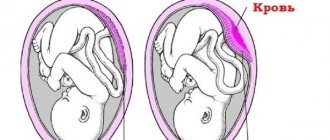Interesting Facts
| Options | Indications |
| Time from conception | 12 weeks |
| Period by month | 14 weeks |
| What month | 4 |
| Dimensions and weight of the fetus | 80–113 mm, 25 g |
| Uterus dimensions | Protrudes from the womb |
Your baby is the size of
Apple
80–113 mm Size
25 g Weight
The fourteenth week of pregnancy is the beginning of the second trimester, the quietest period of gestation. The expectant mother has more strength and energy. And the baby continues to actively grow and learn new skills.
Changes in the body of the expectant mother
Toxicosis is no longer a problem, and the pregnant woman feels good and energetic. It is at this stage that a woman begins to fully realize her pregnancy. My belly is growing and my uterus is now the size of a large grapefruit. Pigment spots and freckles may appear, which will disappear after childbirth.
At fourteen weeks, the desire for hunger is acutely felt - you want to eat both day and night. Perhaps there is a craving for certain foods. This is how the body signals which minerals and substances it lacks.
| Parameters of a pregnant woman | Indicators for this period |
| Weight gain at current stage of pregnancy | 2 – 2.5 kg |
| HCG level in blood | 27300 – 233000 IU/ml |
| Norm of progesterone in the first trimester | 71.50 – 303.2 nmol/l |
What does the belly look like?
At fourteen weeks, a pregnant woman’s belly is already noticeable to others. A photo of the belly at this stage will already show the coveted roundness in comparison with previous weeks. A tummy that protrudes strongly forward can indicate a woman’s narrow or flat pelvis and weak abs. A round and “wide” belly often indicates excess amniotic fluid and a multiple pregnancy. Therefore, the shape of the abdomen is no less important for the obstetrician-gynecologist than the size and shape of the pelvis.
How does a woman feel during this period of bearing a child?
- There is frequent urination. The enlarging uterus puts pressure on the kidneys, ureters and bladder, causing frequent urge.
- Cramps in the calf muscles, back pain and itching in the abdominal area due to stretching of the skin may be bothersome.
- A pregnant woman may periodically experience heartburn. It is often accompanied by increased salivation, chest discomfort, and coughing. Heartburn is especially expected at the end of the first trimester (13th week of pregnancy). The reason for this is often increased intra-abdominal pressure due to the growth of the uterus and increasing pressure on the stomach.
- The discharge may become heavier than it was before. This is due to increased blood supply to the pelvic vessels. There is no reason to worry if test results indicate normal vaginal microflora.
- The drowsiness inherent in the first trimester subsides. The level of estrogen hormones gradually increases and their ratio with progesterone levels out, so sleep becomes more restful.
- Sometimes nasal congestion and runny nose not associated with a cold appear, as the increased amount of estrogen causes swelling of the mucous membrane of the respiratory tract and increases the secretion of mucus.
Feelings of the expectant mother
Most likely, at 14 weeks of pregnancy you are inspired, full of strength and energy. The symptoms of toxicosis, eternal drowsiness, weakness and fatigue are gone. I want to eat deliciously, walk a lot, play sports and sex, work and choose children's clothes. Of course, weakness can make itself felt, because the stress on the body is now colossal. But strength is quickly restored after proper rest.
If this is your first pregnancy, your belly is still barely noticeable to others, but you may feel some changes in your waist. And if you lie on your back, you will probably see a small bump just above the pubis. If your stomach itches, this indicates that the skin is stretching. You can use moisturizers and stretch mark oils to reduce itching.
Many pregnant women develop a pigment line that stretches from the pubis to the navel. After childbirth it will disappear on its own.
Feel
It is quite possible that at this stage of pregnancy, women expecting a second and subsequent child will feel the first weak movements of the fetus. They can be confused with intestinal peristalsis during flatulence, but it is still possible to recognize the child’s movements. The first, not very encouraging changes in appearance appeared: brittle nails and hair, peeling skin, pigment spots, bleeding gums.
If these changes are too pronounced, you need to take vitamin complexes to restore the content of deficient microelements. The lack of calcium, which is actively used by the fetus, is felt by cramps in the legs. To compensate for this condition, you should take calcium-containing medications and introduce cottage cheese, cheese, and fermented milk products into your diet.
The symptoms of toxicosis at week 14 are invisible, nausea, dizziness, and increased irritability have disappeared. This will benefit the fetus, which is sensitive to the mother’s condition. The pregnant uterus begins to put pressure on the abdominal organs, especially the intestines. These changes cause heartburn, discomfort, and quickly passing pain. Negative symptoms disappear if the woman manages to relax and lie down. A set of special gymnastics for pregnant women will help bring your sensations back to normal.
What happens to the fetus at 14 weeks
Compared to the embryo in the first weeks of gestation, now you have almost a real person inside you. He hears sounds from the outside well, recognizes his mother’s voice, makes breathing and swallowing movements, and reacts to light. Expresses his emotions through facial expressions, grimaces and yawns, sucks his thumb.
The heart works at a speed of 160-180 beats per minute. The gallbladder and urinary system are functioning, and peristalsis is observed in the intestines. Now we know for sure whether it is a boy or a girl.
The length of the arms still exceeds the size of the legs, the head is almost a third of the body. Joints appear, cartilage turns into bone tissue.
Fetus. Development at 14 weeks
Fetus at the 14th obstetric week of pregnancy
At the 14th week of pregnancy (according to obstetric calculations), the unborn baby continues to actively grow and develop: it can already reach a length of 8 to 12 cm, weigh from 30 to 50 g. The size of the fetus can be compared to an apple.
At the 14th obstetric week of pregnancy, the second trimester begins. The face of the future baby acquires the features with which he will be born.
The eyes take their place, the ears take their final shape, the eyebrows and bridge of the nose appear.
At the current stage, the fetus acquires cheeks.
Hair begins to actively grow on the head and throughout the body, which performs a protective function. This fluff helps the original lubricant not to be washed off.
The process of vision development continues. The fetus begins to react to light. If you shine a bright lamp on the stomach during an ultrasound, the unborn baby will turn towards the light.
Interesting! At the 14th obstetric week of pregnancy, the taste buds located on the fetal tongue begin to distinguish sweet taste. When a woman eats sweets, an ultrasound scan shows how the fetus begins to actively capture amniotic fluid in its mouth.
Therefore, a pregnant woman should not indulge in sweets, so as not to gain excess weight and not to stimulate the fetus to swallow too much amniotic fluid.
At the current stage, the baby hears some sounds coming from outside.
Scientists claim that it is from the 14th week of pregnancy that the baby can remember the voice of mom and dad, which will allow him to instantly recognize the people closest to him after birth.
A pregnant woman is recommended to listen to pleasant music, talk to the unborn baby, and sing songs to him.
Such communication allows you to improve your own mood and introduce your baby to your voice.
At the 14th obstetric week of pregnancy, the fetus unconsciously begins to smile for the first time.
In general, at the beginning of the week the fetal body does not yet look entirely proportional.
The arms, legs, tummy and chest seem very thin compared to the head. But in 7 days the situation will change a little.
The previously long arms will become shorter than the legs, the limbs will grow to sizes familiar in proportion to an ordinary person.
At the 14th week of pregnancy, the joints of the arms and legs continue to develop and the process of ossification of the skeleton occurs, affecting the spine and the largest bones.
A pregnant woman should be careful about her diet.
Be sure to eat foods rich in calcium (dairy products) and magnesium (chicken eggs, buckwheat, brown rice).
To get enough vitamin D, you need to walk outside and be in the sun for at least 30 minutes every day.
In winter, you can consult a gynecologist about the need to take additional vitamins in the form of drops.
The development of the nervous system in the 14th week of pregnancy is still one of the most important processes.
The central nervous system (brain and spinal cord) enlarges. The cortex is actively developing in the brain, new grooves (future convolutions) are forming.
The active process of creating a hematopoietic system continues.
At the current stage, the spleen begins to produce erythrocytes (red blood cells), which allow oxygen to be delivered throughout the body.
The bone marrow, which in humans is responsible for creating red blood cells, is not yet developed enough to support a fetus.
The liver and spleen help provide the body with the required number of red blood cells. After some time, they will gradually lose this function and begin to perform their usual role.
At the 14th week of pregnancy, the digestive system of the unborn child continues to launch the necessary mechanisms.
Peristalsis begins in the intestines, and it slowly twists into rings, gradually being drawn into the abdominal cavity, settling into place.
For now it is still near the umbilical cord, and if everything is normal, it will take its place in the coming weeks.
At the 14th obstetric week of pregnancy, meconium (original feces) begins to form in the intestines.
It accumulates throughout the entire period of intrauterine development and is excreted from the newborn’s body during the first days of life.
Meconium has a black-green color and a very viscous consistency.
The respiratory system continues to train the muscles that allow the chest to move during breathing.
The respiratory system will develop until birth and will turn on with the first cry of the newborn.
The immune system continues to actively work to create protection for the fetus. Immunoglobulin appears in the blood plasma, promoting the formation of an immune response.
While the child is in the womb, his immune system is directly related to the maternal one, and after birth, for several years, the child uses accumulated immunity, largely borrowed from the parent.
At the 14th obstetric week of pregnancy, the development of the fetal reproductive system continues.
In girls at the current stage, the ovaries are actively developing, and many immature eggs are already appearing in them. In boys, the prostate gland develops.
Tests and ultrasound
After the first pregnancy screening, the doctor and the expectant mother already know about the main parameters of fetal development and the risks of pathologies. If everything is normal, then at week 14 the woman will have to undergo several standard procedures at an appointment with a gynecologist:
- weigh yourself;
- measure blood pressure;
- take a urine test.
The doctor will assess the height of the uterine fundus and the volume of the abdomen, and listen to the fetal heartbeat. An ultrasound at week 14 is performed strictly according to indications: if there is a threat of miscarriage due to bleeding or severe pain in the abdomen and lower back.
If, as a result of 1 screening, risks of fetal development pathologies were identified, additional diagnostic procedures may be prescribed, including amniotic fluid sampling.
Tests and studies during pregnancy
Ultrasound (ultrasound examination) - 12-14 weeks after the first day of the last menstruation.
Determination of gestational age, number of fetuses, exclusion of malformations of the nervous system, abdominal organs, fetal limbs. Blood test for AIDS (HIV), syphilis (RW), hepatitis B - when registering for pregnancy (antenatal clinic, specialized medical center, advisory clinic at a maternity hospital, etc.). These diseases can complicate the course of pregnancy and require a special approach to patient management.
Analysis for blood group and Rh factor - when registering for pregnancy. If there is a risk of Rh conflict (if the woman has a negative Rh factor and the husband has a positive one), pregnancy requires special monitoring.
General and biochemical blood test, blood sugar test - when registering for pregnancy. They give an idea of the general health of the pregnant woman and possible chronic diseases.
General urine test - when registering for pregnancy, then before each visit to the doctor. Indicates the quality of kidney function.
Vaginal smear - when registering for pregnancy. Assessment of microbial flora, exclusion of urogenital infections.
Tests for urogenital infections - according to indications .
Hormone analysis - according to indications .
Possible complications of pregnancy
If, despite feeling normally, you suddenly experience pain, exercise caution. Pain in the lower abdomen at week 14 may be associated with increased uterine tone. Often the condition is temporary and goes away on its own after proper rest. But sometimes it requires drug treatment in a hospital setting.
Vaginal discharge
During pregnancy, the mucous membrane is especially vulnerable to various fungi. Therefore, many women develop candidiasis. Itching, burning, cheesy discharge with a pungent odor - these symptoms cannot be confused with anything. Urgent treatment is necessary, because the condition is dangerous because the child can become infected during childbirth. Fungi infect the lining of his mouth, making eating painful for him.
If you observe spotting and spotting, do not hesitate to go to the hospital. Bleeding at 14 weeks is associated with fetal freezing, pathologies and injuries to the cervix, but most often with a lack of progesterone. The latter condition is successfully treated with the hormonal drugs Utrozhestan or Duphaston. If you have previously had miscarriages or threatened to terminate a previous pregnancy, discuss with your gynecologist the need to take such medications.
Discharge: norm and pathology
Normally, vaginal discharge has remained almost unchanged since the beginning of pregnancy - it is clear or milky-gray discharge with minimal volume. If the discharge is accompanied by a burning sensation, itching of the external genital organs, the appearance of pus or mucus, it means that the woman is infected with gonorrhea, chlamydia, trichomoniasis, and other sexually transmitted infections.
Such manifestations should be diagnosed by taking a smear for urogenital infections and treated taking into account pregnancy.
Decreased immunity and changes in the vaginal microflora become an impetus for the proliferation of fungi that cause candidiasis or thrush. A characteristic symptom of candidiasis is a cheesy yellow-green discharge and a burning sensation in the vagina. Candidiasis is treated under the guidance of an obstetrician-gynecologist leading the pregnancy.
Bloody discharge not accompanied by abdominal pain is a symptom of cervical erosion. Most often, a woman notices such discharge after sexual intercourse or a gynecological examination using a mirror.
Lifestyle
Our main recommendation for the 14th week of pregnancy is to watch your diet. It should be fractional, 5-6 times and as varied as possible. You and your baby need a lot of nutrients right now. Discuss with your doctor the need to take vitamin complexes. Perhaps, if your diet includes a large number of vegetables and fruits, you are not a vegetarian and like fish and dairy products, you do not need additional vitamins.
Recommended types of physical activity
- Swimming and water aerobics;
- dancing of any direction, but without the risk of falling and injury;
- yoga and pilates;
- specialized classes for pregnant women;
- walking.
Remember that lack of movement will negatively affect both your health and the development of the fetus.
Intimacy
In the second trimester, many pregnant women notice an increase in sexual desire. There are no prohibitions on physical intimacy. The only contraindication is multiple pregnancy and problematic gestation.
What may concern you
| Increased blood pressure | On average, about 2% of all pregnancies are accompanied by hypertension. High blood pressure in the second trimester can negatively affect the baby's condition. Alarming signs are periodic headaches, tinnitus, nosebleeds and unpleasant pressing sensations in the heart area. If a pregnant woman has a tendency to have high blood pressure, you should definitely inform your doctor about this. |
| Phlebeurysm | During pregnancy, veins can be compressed by the growing uterus, which leads to impaired venous outflow. If there is a predisposition to varicose veins, pregnancy creates all the conditions for the development of the disease. As the period increases in weeks, the severity of the signs of this disease also increases. |
| Digestive problems | During the period of bearing a child, many pregnant women experience dyspepsia - functional digestive disorders. It is important in what trimester the problems in the gastrointestinal tract began. In the 2nd trimester, chronic diseases can worsen, and with poor nutrition, the digestive system becomes overloaded. In case of discomfort in the stomach and intestines, it is important to seek recommendations from a gastroenterologist. |
| Haemorrhoids | Constipation is a common problem in pregnant women, causing the appearance and development of hemorrhoids. Constipation can be caused by both an unbalanced diet and the hormone progesterone. It causes relaxation of vascular walls and ligaments, and reduces intestinal motility. Constipation, like hemorrhoids itself, cannot be ignored so as not to worsen your health. |
| Insomnia (sleep disorders) | Problems with falling asleep and uncomfortable sleep in pregnant women can be caused by many reasons: depression, stress, diseases of internal organs. The urge to go to the toilet at night and an enlarged belly, which does not allow you to take a comfortable position, also contribute to insomnia. How to help yourself? Remember the simple tips about your daily routine, ventilation, a warm bath and tea from “sleepy herbs” before bed. If insomnia persists, consult a psychologist to find the cause of your anxiety. |
| Decreased hemoglobin in the blood | The most active loss of iron begins just after the 14th week, which coincides with the period when the process of hematopoiesis begins in the fetus. If a woman's iron stores are depleted, she develops iron deficiency anemia of pregnancy. The normal hemoglobin content in the 2nd trimester is 112-130 g/l. Expectant mothers with mild to moderate anemia are treated on an outpatient basis. |
Checklist for 14 weeks of pregnancy
- Choose clothes that do not restrict movement and comfortable shoes without heels.
- Think about how to communicate your new position to loved ones, colleagues and management at work.
- Don't forget about Kegel exercises and breathing exercises for pregnant women. These skills will be especially useful to you during childbirth.
- Talk to your baby and think about good things: both you and your child need positive emotions now.
If you still have questions about what happens to the pregnant woman and her unborn child at 14 weeks of pregnancy, you are confused by the results of the first screening or are worried about any unpleasant sensations, contact the specialists of the Women's Medical Center. Let us remind you that you can contact the gynecologist managing your pregnancy at the MLC at any time convenient for you.
Effect of toxins on fetal development
Although all the main organs of the unborn child are already functioning, and there is no fear of mutations due to toxic effects, developmental disorders of the child are possible due to exposure to nicotine, alcohol, and drugs. The placenta is an excellent barrier to protect the baby, but it cannot protect against some toxins. Alcohol and nicotine, once in the blood, will immediately end up in the child’s circulatory system and penetrate the brain.
These toxic factors cause placental insufficiency, and the fetus immediately experiences a lack of oxygen and nutrients. Passive smoking and staying in a smoky room have the same properties.
Video about the condition of the fetus at 14 weeks, about toxins that affect a woman’s well-being:
Pregnant woman's diet
In the fourteenth week, it is important to enrich the pregnant woman’s menu with all useful biologically active substances. This is easy to do: you need to include seasonal fruits and vegetables in your diet of all colors: yellow, orange, green, purple and red. If one of the expectant mother’s unloved foods, for example, pumpkin, then it can be replaced with a vegetable or fruit of a similar color - carrots, yellow zucchini, apricots.
Pregnant women should avoid certain foods during this period, because... Due to the large amount of tyramine, they cause a narrowing of blood vessels, which is fraught with poor health and spontaneous headaches. Here is a short list of them:
- smoked/dried/marinated fish and meat;
- sausage, frankfurters, sausages;
- concentrated broths;
- kvass;
- pickled vegetables;
- Parmesan, cheddar, brie, Roquefort cheese;
- soy sauce, soy paste, soy curd.
Here's what a sample menu might look like at 14 weeks of pregnancy:
| Eating | Food and drink options |
| First breakfast | Oatmeal with milk and banana, sandwich with butter and cheese (Gouda), cocoa or chicory |
| Lunch | Baked apple with honey and walnuts, a handful of dried apricots, tea with chamomile and lemon balm |
| Dinner | Meatball soup, croutons, baked chicken breast with tomatoes and cheese, milk jelly, apple or orange juice |
| Afternoon snack | 200 ml drinking yoghurt without additives, muesli bar |
| Dinner | Boiled rice, baked fish (trout), fresh vegetable salad with olive oil, a slice of rye bread, dried fruit compote |
| Before bedtime | Sesame crackers, a glass of kefir |
How to make food easier to digest:
- at night, eat food 2-2.5 hours before bedtime;
- avoid heavy meals before bed;
- eat heated food, which puts minimal strain on the digestive system;
- a pinch of saffron and turmeric in a dish makes it easier to digest any food;
- You should not combine freshly prepared food with leftovers from previous meals;
- It is not recommended to mix hot and very cold foods at the same time, as this stresses the digestive enzymes.
What about vitamins? In the 2nd trimester, the expectant mother's need for vitamins and microelements increases. At this stage of the baby’s development, the following are very important:
- magnesium - this element ensures the functioning of the placenta, improves the elasticity of muscle fibers and their contractility;
- Vitamin D is necessary for the formation of the fetal skeleton. With a deficiency of this vitamin, calcium is poorly absorbed and the development and strengthening of the baby’s skeletal system is hampered. According to statistics, more than 90% of residents of central Russia experience vitamin D deficiency;
- B vitamins – participate in the development and formation of the circulatory, nervous, and digestive systems. They also keep mom’s skin hydrated and prevent moisture loss. Doctors recommend taking vitamins from this group throughout pregnancy.
Whether to choose a vitamin complex, a single drug in a prophylactic dosage, or adjust the menu - the doctor should make the choice, because a lot depends on the condition of the expectant mother.










